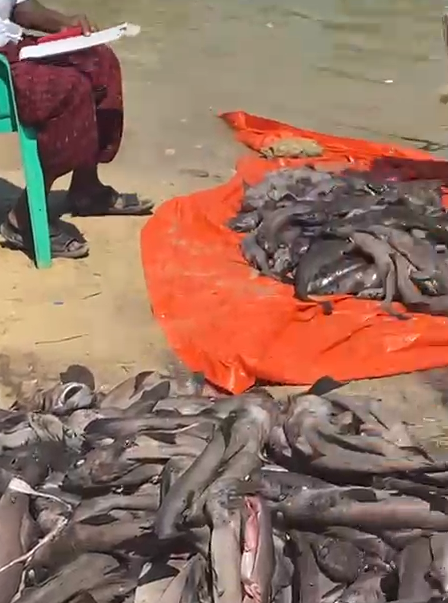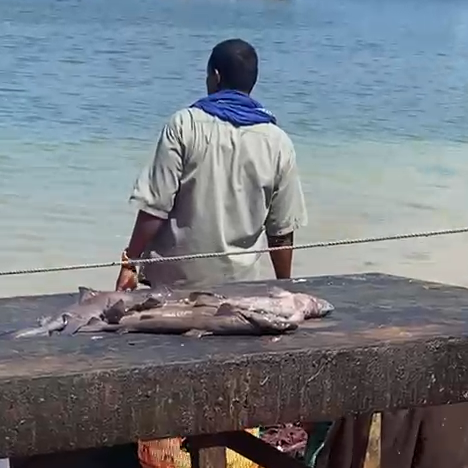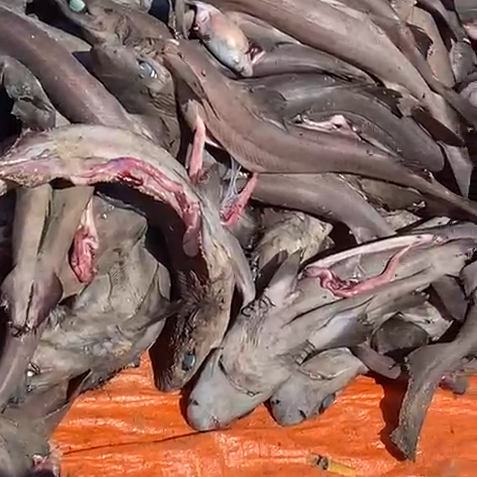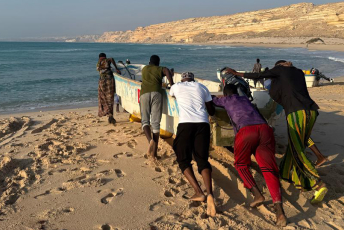Nagfish, the primary fishing landing site in Bosaso, Somalia, is a beehive of activity from 3am to 9am daily. ENACT researchers watched traders, fishermen, casual labourers, brokers, food sellers and Puntland government officials haggle, shout and exchange pleasantries over the night’s catch amid dilapidated fish processing facilities wedged between makeshift food joints and open fish markets.
All varieties of fish and crustaceans land here but the small gulper sharks are the main attraction. While a scribe notes the volume caught, a young man slices the sharks on a large, dirty table, extracting livers and maws, and putting the organs in plastic buckets. ‘The business looks good,’ he says, smiling.
 A fish broker documents the details of the gulper shark catch at a landing site in Bosaso |
The gulper shark liver oil is at the centre of an emerging illegal enterprise in Somalia’s Puntland region. TRAFFIC reports that it is highly prized for its squalene-rich liver oil, used for cosmetics, food supplements and pharmaceuticals, especially in Asian markets.
Currently, the International Union for Conservation of Nature categorises several gulper shark species as vulnerable or endangered. Gulper sharks have slow development, late sexual maturity (16 for females and 18 years for males) and low reproductive rates generating only one pup per two-year gestation period. This means they are especially vulnerable to overfishing and their population cannot rapidly recover from depletion.
Researchers note that deepwater sharks are among the most sensitive marine vertebrates to overexploitation. Half the species targeted for the international liver-oil trade are threatened with extinction, and there has been a 97% drop in the Southern Indian Ocean gulper shark population between 2015 and 2020, according to TRAFFIC data.
The global shark liver oil market was valued at about US$157.2 million in 2024 and is estimated to reach US$263.6 million by 2033.
The Puntland government banned gulper shark fishing and introduced several new measures to strengthen its maritime governance in August 2024. However consistently weak enforcement capacity enables trade in the prized oil to flourish in the semi-autonomous region.
ENACT research in Bargaal, Qandala and Bosaso in Puntland confirms this worrying trend in the Gulf of Aden. Interviewees said illicit trade in gulper shark oil has also attracted highly placed state-embedded actors, local clan elders, businessmen and fishers involved in its fishing, processing and exporting.
They said Somali fishermen are catching this vulnerable species and removing their swim bladders and livers, without regard for sustainability. Though no official statistics exist, local fishermen note that the volume of gulper shark catches is declining.
 |
 |
| Gulper sharks on a makeshift table at the landing site | |
Despite Ministry of Fisheries and Marine Resources bans, shark fishing and shark liver oil processing persists. The organs are sold to a limited circle of buyers operating from Bosaso. Regardless of size, each organ is sold for roughly US$1. The buyers extract the oil in makeshift processing plants using rudimentary and unregulated methods without oversight, environmental controls or permits.
‘The livers of the gulper sharks are taken out and refined to get the priceless oil,’ a processing plant operator told ENACT anonymously. ‘We mince the liver, heating it to between 70°C and 100°C, then add alkaline solutions to control pH levels.’ The oil is distilled and filtered using intricate centrifugal techniques, removing any contaminants to produce the liver oil high in squalene.
In Bosaso, small teams connected to exporters or brokers monitor oil quality and preparation for transportation. The absence of regulated processing does compromise product quality and exposes the workers to environmental and health hazards, including from dumping waste that contains harmful compounds.
Local costs for shark liver oil in Somalia vary from US$14.44 to US$38.50 per kilogram, with the end-buyer paying significantly more in foreign markets.
Interviewees said the oil is illegally loaded onto foreign vessels at sea to avoid detection, bypassing Puntland ports, landing sites or legal export channels. The oil shipments are hidden under authorised exports or passed via middlemen to conceal their source.
These covert methods suggest the existence of a shadow supply chain, operating beyond the reach of authorities and fuelling demand in overseas markets, primarily China and the Gulf region, respondents said.
 Gulper shark liver oil supply chain |
TRAFFIC Fisheries Trade Programme Leader Glenn Sant and Senior Programme Coordinator Markus Burgener say many unknowns exist regarding gulper shark overexploitation. These include the scale of the global trade in gulper shark oil, the sourcing and capacities of various oil processing countries, and the quality of the oil in circulation given the lack of quality standards. They say the lack of distinct codes for gulper shark oil makes it impossible to know how much oil is graded or exported.
However, Sant says a Convention on International Trade in Endangered Species of Wild Fauna and Flora (CITES) proposal is currently being discussed, with gulper sharks possibly being listed as endangered in December 2025. Once listed as endangered under CITES, countries must issue official licences to vessels to fish the gulper shark legally and sustainably.
Countries that allow for illegal fishing of such species in their waters risk having their products banned globally. They would need to ensure the traceability of their gulper shark products to legal and sustainable fishing practices.
While bans have proven unsuccessful, they do provide a necessary first step in preventing and taking action against the illicit trade. Harmonising legal regulation on gulper shark fishing and oil processing should also be agreed on at the federal and member state levels.
Equally important is gathering accurate data on gulper shark refuge habitats, and establishing a comprehensive management strategy for the species. Implementing a marine monitoring and surveillance system has shown success in illegal, unreported and unregulated (IUU) fishing. Indonesia, was the first country to publicly share its vessel monitoring system by partnering with Global Fishing Watch, this allows for more transparent commercial fishing data and fisheries management.
Increased investment in marine surveillance and law enforcement capacity, including international partners such as the Food and Agriculture Organization, UN Office on Drugs and Crime, and European Union could enable Somalia to identify and discourage IUU fishing operations.
Halkano Wario, ROCO East Africa, ENACT, Abdullahi Said Jimale, Marine Biologist and Independent Researcher, and Samira Abdi, ENACT Nairobi
Image: GUY PETERSON / AFP







